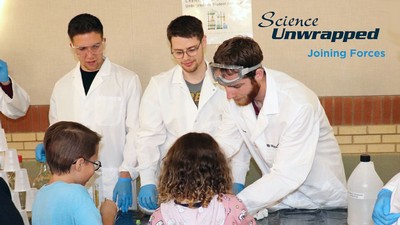USU Vaccine Expert Weighs in on COVID-19 Vaccine, Debunks Myths
By Marcus Jensen |
Scientists from across the world have been working around the clock to produce a COVID-19 vaccine. Utah State University Infectious Disease, Vaccines and Antiviral Chemotherapy professor Bart Tarbet has firsthand experience creating and testing vaccines. Seeing a vaccine become available in just nine months and seeing how many doses need to be created to vaccinate the entire world, Tarbet is astounded at how quickly medical science has moved.
“It is kind of remarkable to even think of the logistics,” he said. “Billions of doses of vaccines need to be produced, tested for quality, distributed, and then given to the people that need it. That is a challenging proposition.”
Prior to taking his position at USU, Tarbet worked in the veterinary vaccine industry. Having more than 25 years of experience in vaccine research, he knows the ins and outs of how vaccines work and what information is correct and what is not.
Tarbet has heard many misconceptions about vaccines. The one most common to him is that vaccines are harmful to the human body. The truth, as Tarbet attests, is that vaccines are heavily tested before they are even introduced into humans.
“One of the very first things that are evaluated before vaccines ever go into clinical trials is they are evaluated in animals for safety and efficacy,” he said. “This means that the vaccine already shows the ability to work. If it does not, red flags fly and it is shut down very quickly before it ever reaches human trials.”
Another fear of vaccination is that a vaccine can actually cause an infection. While some people can get side effects from a vaccine, Tarbet says this is not a person becoming infected. It is the body creating an immune response and learning how to fight off the virus.
“An inactivated flu vaccine cannot give you the flu, that just isn’t possible,” he said. “Vaccines produce an immune response. They activate cells that migrate to those same sights that a virus would grow in. So, you may have minor symptoms from a vaccine but that is from our own natural immune response, not the virus itself.”
The third misconception is that a vaccine reacts the same way in every person. On average, 90 percent of people in a diverse population who receive any vaccine have a similar immune response inside the body. However, on either side of the bell curve, there are those who either have a stronger response to the vaccine, or a weaker response. The goal of every vaccine is to elicit a sufficient immune response to fight off infection in the vast majority of the population.
“Ten percent of people will have different responses to the vaccine as those of the general population,” Tarbet said. “They will either have a lower response or a higher response. But I think even a limited immune response is better than none.”
The long-term effectiveness for the new coronavirus vaccine is still being determined, because it is the first vaccine of its kind using mRNA and the first ever for the SARS-CoV-2 virus. However, Tarbet is confident in the science that has gone into the new technology.
“This is a new technology that has been evaluated for safety for more than 10 years now,” he said of mRNA vaccines. “Do I believe in the vaccine? Absolutely! The questions that remain are about when immunity starts after vaccination and how long that immunity will last.”
Above everything, Tarbet is preaching patience to those waiting for the vaccine and for the global pandemic to finally end. He is also advising trust in the Center for Disease Control and other health organizations, because new information is being gathered every day.
“This is the first time in our lifetimes that we've had a pandemic of this level and of this nature,” he said. “We are learning so much more every single day and are adjusting to this new information as soon as we get it. We are moving just as fast as we can.”
Tarbet advises all to get the vaccine as soon as it is available, which still could take months. He has seen vaccines change the world for the better, and he trusts the COVID-19 vaccine will do the same.
“Vaccines are a medical miracle,” he said. “In the end, people may be offered a vaccine and choose not to have it, and that’s their choice. But I certainly would.”
USU Infectious Disease Professor Bart Tarbet has more than 25 years of experience in vaccine research. Common myths for vaccines include: vaccines are harmful to the human body, vaccines can be infectious, and vaccines react the same way in every person. Tarbet explains how each of these statements is false.
WRITER
Marcus Jensen
News Coordinator
University Marketing and Communications
marcus.jensen@usu.edu
CONTACT
Lynnette Harris
Marketing and Communications
College of Agriculture and Applied Sciences
435-764-6936
lynnette.harris@usu.edu
TOPICS
Society 530stories Faculty 332stories Health 322stories COVID-19 157storiesComments and questions regarding this article may be directed to the contact person listed on this page.









